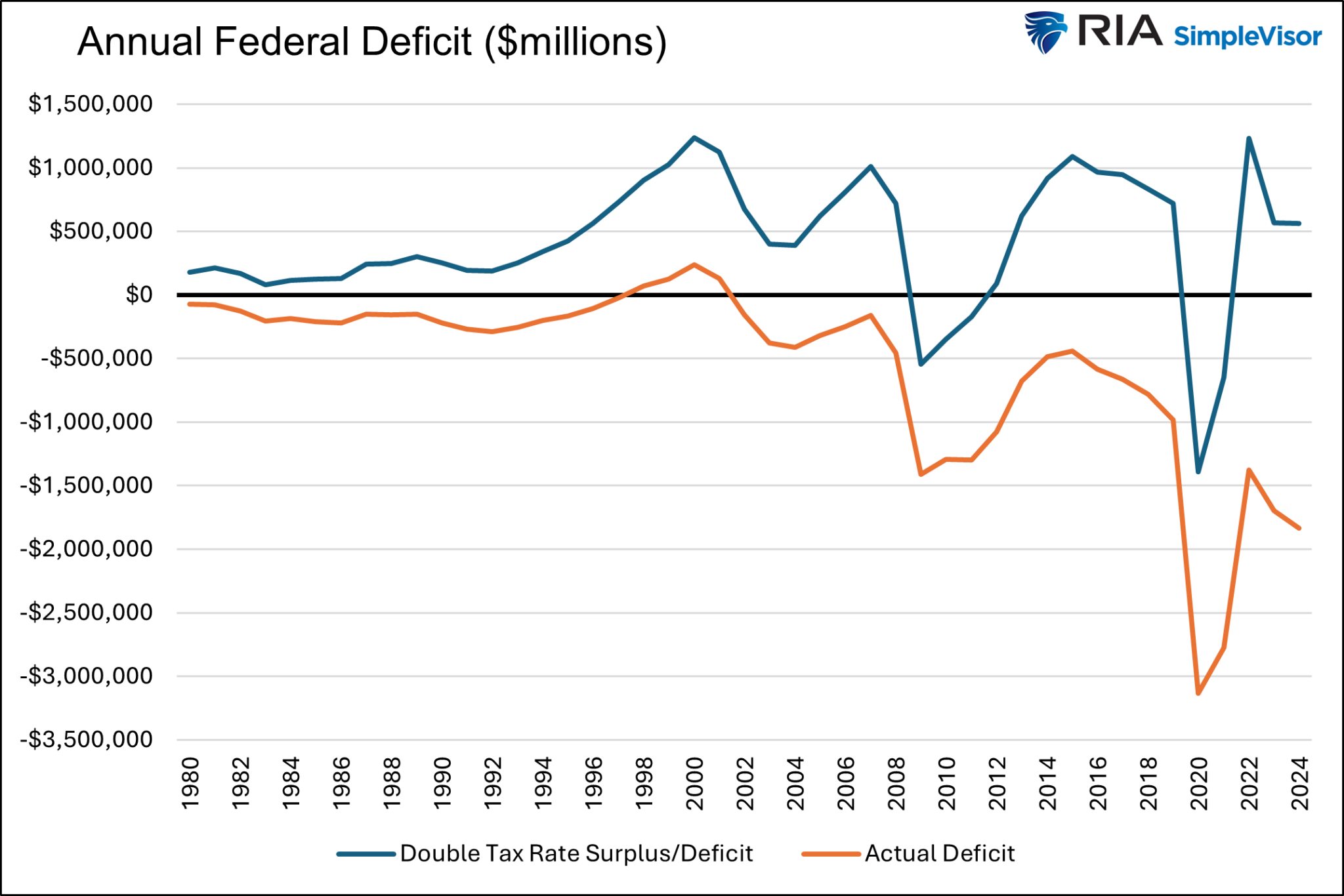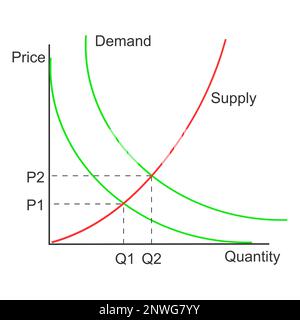By falling significantly short of its intended savings goals, the DOGE program underscores the substantial challenges that hinder efforts to reduce federal spending and cut the deficit. Furthermore, its failure suggests that a more expedient way to reduce the deficit might be to increase federal revenue.
Thus, we pose the simple hypothetical question: What if the government were to double taxes overnight?
While we do not support larger deficits or promote them, this article provides a better understanding of how fiscal deficits are part of a bigger picture, the tradeoff between private and public sector deficits and surpluses.
Your opinion on the fiscal deficit may change after reading this article.
What If?
What would happen if the President and Congress agreed to double personal tax rates overnight? Before you continue, formulate your answer to how a doubling of taxes would impact the deficit, economic activity, and inflation.
Our thoughts are below.
Deficits
The annual deficit for the fiscal year ending on September 30, 2024, was $1.832 trillion. The total personal income taxes collected for that fiscal year were $2.394 trillion. Had taxes been doubled, assuming unrealistically that everything else remained the same, the government would have run a $561 billion surplus. Problem solved, or is it?
The graph below shows that in all but five of the last 45 years, the government would have run a fiscal surplus if taxes were double what they were. And again, we emphasize that this assumes everything else remains unchanged.

Economic Activity
In the discussion above regarding the deficit, we acknowledge that our assumption of a doubling of taxes with no impact on anything is grossly flawed. The fact is that all the other components used to quantify the deficit would change drastically if taxes were raised.
For example, with a sudden decline in disposable income due to tax increases, consumers would spend significantly less. In recent years, personal consumption has accounted for approximately 80% of personal income. Moreover, as we wrote in The Wealth Effect Is Not Always Virtuous ,
Consumers in aggregate are likely to spend 61 cents of every dollar they earn in additional income. Income relates to salaries and bonuses, as well as government-related benefits such as lower taxes or stimulus payments.
It’s impossible to estimate how a tax hike would impact consumption. However, it’s fair to say that if taxes were doubled, consumers would have $ 2.4 trillion less income to spend. If we assume consumers continue to spend 80% of their income, that implies they would spend $1.92 trillion less than they would have had taxes not doubled.
If we use the 61% figure based on marginal changes in income, consumption would be about $1.46 trillion lower than current levels.
Personal consumption accounts for about two-thirds of GDP . Subtracting those estimates from the most recent GDP results in negative GDP growth of 5.0 to 6.5%. The only time since the Great Depression that the US saw a similar decline was during the second quarter of 2020, when the pandemic shut down the global economy.
Let’s take the hypothetical analysis one step further. Consider how companies might respond to such a significant loss of revenue. Layoffs would likely skyrocket, and consequently, consumers would have even less to spend.
The result of higher tax rates is that fewer people would be employed, thus tax revenue would decline, and the surplus we noted above may no longer be a surplus.
Inflation
The impact of higher taxes on inflation is relatively straightforward. While it’s impossible to quantify, we know that the Economics 101 supply and demand curves dictate prices. As the graph below shows, demand would decline due to higher taxes.
Thus, the demand curve (green) would shift to the left. As a result, the price would fall from P2 to P1. The magnitude of the shift is unknown, but we think almost all economists would agree that inflation would decline.

Private and Public Sector Savings Accounts
The point of the exercise was not to quantify the impact of raising taxes, but to present an alternative perspective on the deficit argument. Yes, high deficits are harmful and unsustainable. However, as we mentioned earlier, a budget surplus could potentially cause significant economic harm in the short term.
The sectoral balance identity is a fundamental accounting concept stating that the sum of public, private, and foreign sector balances must equal zero. Think of the accounting identity as a scale. When one side goes up, the other goes down, but the average change from neutral is always zero.
Illustration of the scales of justice symbolizing the measure of a case’s support and opposition in a court of law.
For this discussion, we leave out foreign sector balances.
Throughout the vast majority of the last fifty years, the public sector has run a deficit, while the private sector has run a surplus. Think of it simply as when the government borrows, it is, in some form, giving those funds to the private sector.
In turn, the private sector returns those funds, in part, to support the government. In this case, government borrowing generates economic activity. Moreover, private funding of the debt reduces economic activity, as the money cannot be used for consumption or productive investments.
Government Austerity Has A Price
Conversely, when a government runs a surplus, the burden of economic growth shifts toward the private sector. In such circumstances, citizens and corporations need to increase borrowing or reduce savings to maintain economic activity.
For example, one of the causes of the 2012 European debt crisis was the push for financial austerity by some European countries in the wake of the 2008 financial crisis. As a result of cutting deficits, household and business incomes were negatively impacted. This forced the private sector to either borrow more to sustain consumption or cut spending, which exacerbated their respective recessions.
The private sector uses capital more productively than the public sector. Thus, in almost all cases, shifting the burden of economic growth from the public sector to the private sector is beneficial in the long run. However, the adjustment can be economically painful in the short run.
Summary
As Americans, we have an essential consideration to make regarding fiscal deficits:
- Do we want to grow our economy stronger and more productive in the long run at the risk of an economic shock in the short run, or,
- Do we want to perpetuate the current fiscal schemes, avoid the high cost of creating a more robust economic foundation, and settle for less in the future?
Unfortunately, most politicians care more about the next election than the public’s welfare in ten or twenty years. Furthermore, many wealthy citizens and corporations who heavily fund politicians would also prefer to kick the can rather than pay the piper.
The questions we pose above are incredibly difficult to answer. However, more importantly, we hope you now understand that while the deficit is a problem, it is also a benefit. But the benefit is short-term in nature and comes at the expense of future prosperity.

